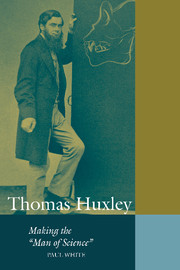Book contents
- Frontmatter
- Contents
- Illustrations
- Acknowledgments
- Introduction
- 1 Science at Home
- 2 Gentlemen of Science? Debates over Manners and Institutions
- 3 Science as Culture
- 4 The Worship of Science
- 5 “Darkest England”: Science and Labor in the 1880s and 1890s
- Conclusion: The End of the “Man of Science”
- Bibliography
- Index
- Frontmatter
- Contents
- Illustrations
- Acknowledgments
- Introduction
- 1 Science at Home
- 2 Gentlemen of Science? Debates over Manners and Institutions
- 3 Science as Culture
- 4 The Worship of Science
- 5 “Darkest England”: Science and Labor in the 1880s and 1890s
- Conclusion: The End of the “Man of Science”
- Bibliography
- Index
Summary
I have nearly traversed half the globe and have found only error and discord till I came to your cottage, where truth and happiness reside.
– Bernardin de St. Pierre, The Indian CottageIn 1846, Thomas Huxley received an appointment on HMS Rattlesnake, a survey vessel bound for the South Seas. In his shipboard diary, the twenty-one-year-old called himself a “man of science,” but the designation was highly tenuous. His official title was assistant surgeon, a low-ranking officer in Her Majesty's Navy. With only two years of formal schooling, Huxley had been apprenticed to general medical practitioners in Coventry and London's East End. With the help of a scholarship, he had taken courses at Charing Cross Hospital and had read comparative anatomy and physiology in the library of the Royal College of Surgeons. Having completed the first examination for the degree of Bachelor of Medicine at University College, but lacking the financial means to continue his education, he entered the navy in 1845. A position on a survey voyage afforded a young man an excellent opportunity for furthering a career in science; however, Huxley was not the official naturalist on the Rattlesnake. This title fell to the ornithologist John MacGillivray, whose father was a professor of natural history at Aberdeen. Such dredging and dissection as Huxley desired to perform would have to be supplementary to his medical duties. His scientific findings were not guaranteed a place within the official report of the voyage.
- Type
- Chapter
- Information
- Thomas HuxleyMaking the 'Man of Science', pp. 6 - 31Publisher: Cambridge University PressPrint publication year: 2002
- 1
- Cited by

